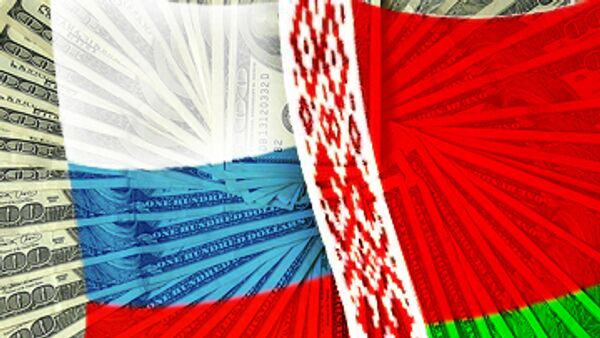MOSCOW. (Political analyst Kirill Koktysh for RIA Novosti) - Russian President Dmitry Medvedev's meeting with Belarusian journalists at his residence in Barvikha, near Moscow, on November 23, was bound to become a high-profile event in Russian-Belarusian relations.
Belarusian President Alexander Lukashenko initiated regular meetings with Russian journalists several years ago to offer his interpretation of bilateral relations. Now the Russian leaders have decided to talk not only with their Belarusian counterparts but also with the media community in general. One reason for this could be the insufficient effectiveness of one-on-one meetings.
What has happened to Russian-Belarusian relations? Why has the level of mutual trust fallen so low, as both sides admit?
Numerous problems have darkened this year's celebrations of the establishment of the Union State of Russia and Belarus. Worse still, these problems are believed to have become systemic and therefore not easily resolved.
The two countries' strategies have become opposing, unfriendly and even mutually exclusive in the last few years.
Russia is working hard to complete the BTS-2 Baltic pipeline system to ship oil around Belarus. When the pipeline comes on line in 2011, it will greatly lessen Russia's transit dependence on Belarus and also weaken the transit status of that country.
Meanwhile, Belarus has joined the Eastern Partnership, a project initiated by the European Union to ease the transit countries' dependence on Russia through consolidation. It was inaugurated in Prague in May 2009.
Russia's subsidies to Belarus, which have reached $50 billion since 1991, can be explained by its transit dependence on Belarus, which ships up to 80% of Russian oil and 20% of its natural gas to Europe.
Before the global economic crisis, Russia exported hydrocarbons worth over $100 billion via Belarus annually. Minsk authorities viewed the $5 billion subsidies, which account for at least 40% of the Belarusian budget, as fair payment for the safety and reliability of transit shipments.
The transit status Belarus inherited from the former Soviet Union was the key reason for establishing the Union State. No other comparable tie has developed in bilateral relations since its establishment. This explains Russia's oil and gas bypass strategies and the current cool period in bilateral relations, in which periods of respite were intermingled with sugar, dairy and other trade wars.
The biggest question no one can answer now is how Russian-Belarusian relations will develop after Russia completes the bypass projects, when it will no longer have to pay the obligatory subsidies to the Belarusian economy. Until then, the key question will be how much Russia is affected by Lukashenko's struggle for the transit status quo.
So far, Belarus has opted for a strategy of suspending integration projects that are vital for Russia. For example, it hindered the signing of the agreement on the Collective Rapid Response Force of the CSTO member states, leaving the future of the CSTO agreement hanging. The Collective Security Treaty Organization (CSTO) comprises Armenia, Belarus, Kazakhstan, Kyrgyzstan, Russia, Uzbekistan and Tajikistan.
The future of the Customs Union of Russia, Belarus and Kazakhstan may also be vague. The agreement is to be signed by the end of 2009, and Belarus can use it as another bargaining chip for privileges.
The year 2009 is the last year before BTS-2 system start-up, with Russia still fully dependent on Belarus for hydrocarbon transit. Will the construction of the Nord Stream and South Stream natural gas projects bypassing Ukraine, which have been given a fresh boost this autumn, encourage the Ukrainian and Belarusian authorities to consolidate their positions on the transit issue?
This would make the threat of a supplies blockade maximally large for Moscow. Belarus could do this not to spite the ally, but to compensate the losses it sustained because of the crisis and future shortfalls. The crisis has halved Belarusian export revenues, which make up as much as 75% of its budget.
Under these circumstances, the Belarusian president may resort to a confrontation with Russia to ensure his political survival.
No systemic solution has been proposed to any of these problems. The meetings of the Belarusian president with the Russian media and of the Russian president with the Belarusian media cannot solve them. Relations can be promoted only if they rest on a pragmatic foundation.
Strangely, the time could be right for building such a foundation. The crisis, which has destroyed the consumer economy as such, has also shifted the focus to reviving the producer economy and developing a common market to service it.
Belarus is the only country in the region with an excessive number of skilled workers. Russia has an abundance of know-how but lacks the workforce for implementing it.
This is a good time for finding points of contact and in this way preventing bilateral relations from getting worse.
Kirill Koktysh is a board member of the Association of Political Experts and Consultants
The opinions expressed in this article are the author's and do not necessarily represent those of RIA Novosti.



